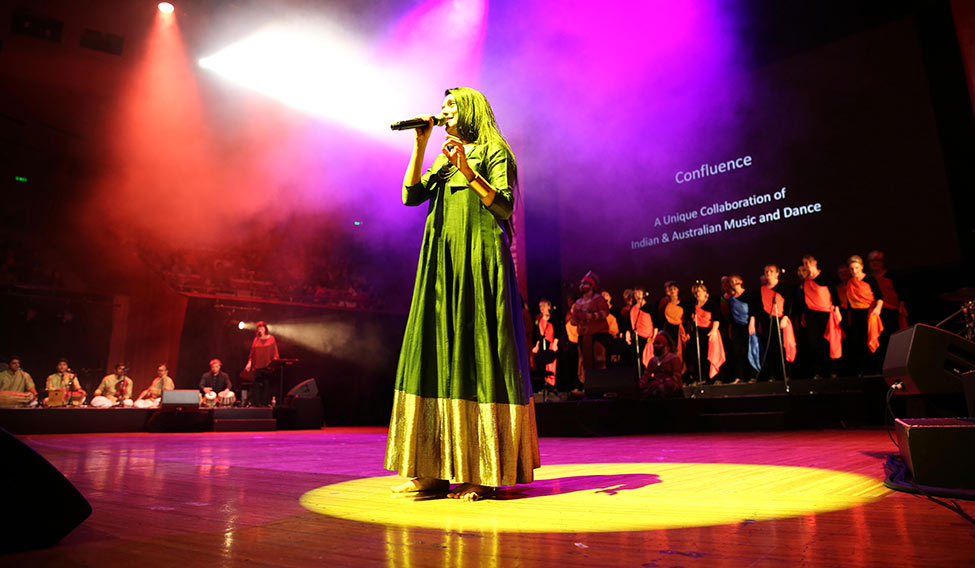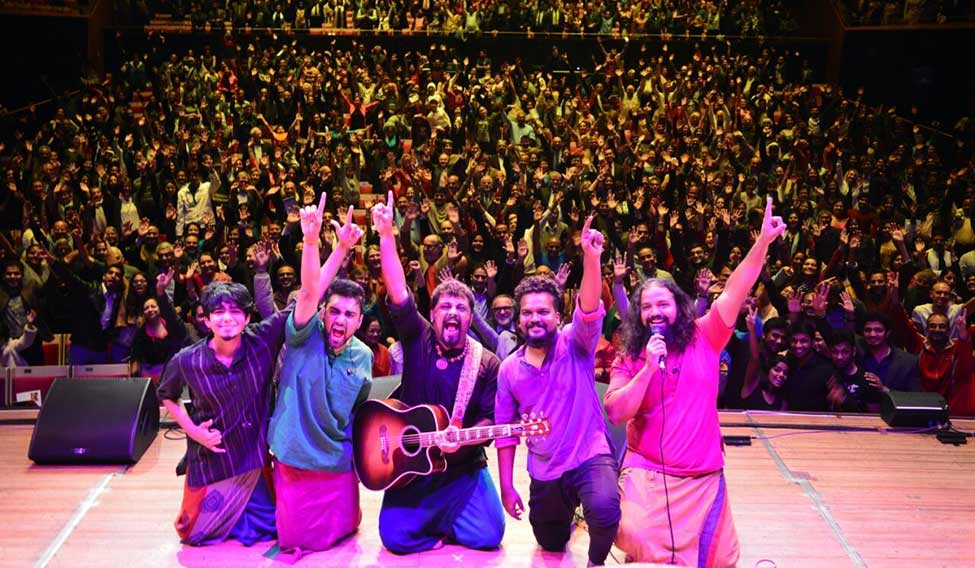A man in a lungi strummed his guitar and asked the audience to repeat the lyrics—Lokada kaalaji madatheenanti, ningyaar byaadantaara madappa chinti (Don’t worry, be happy. But if you want to worry, I don’t give a damn). The Kannadigas in the crowd joined in; the Australians tried in earnest. Then came the guitar riff, and the listeners raised their hands, making waves and unleashing applause. Over the course of half a dozen songs, interspersed with ambitious dance moves and wisecracks, Raghu Dixit and his band of merry men enthralled the Sydney Opera House. After the final bow, they capped off the night with a selfie and a promise to meet everyone outside.
Men in lungis might seem incongruous with the hallowed arts centre. But that is the essence of Confluence—The Festival of India, which celebrates Indian arts and culture, from August 15 to November 8, across seven Australian cities. Prime Minister Narendra Modi had announced the festival during his visit to Australia in 2014 and, in July this year, the Australian government announced 250,000 dollars to support it. The aim of the festival was to improve bilateral relations between the countries and to foster people to people connections. On board were India’s culture ministry, the Indian Council for Cultural Relations and the Indian High Commission in Australia, along with sponsors, including the Australian government. Delhi-based Teamwork Arts handled the production of the event.
On September 18, at a gala event at the Sydney Opera House, Union Culture Minister Mahesh Sharma said: “It is a proud moment for both nations and we should celebrate India-Australia relations in a big way. It is cultural bonds that build solid bridges of friendship and understanding. It is our hope that this event promotes better understanding among the various communities.”
The tickets for the gala event—1,800—were sold out in 15 minutes.
On the festival’s website, Australian arts minister Mitch Fifield said: “The festival gives Australians unique access to India’s contemporary arts and culture. I hope the festival will result in long-lasting collaborations between Indian and Australian artists.”
On September 16, again at the Opera House, The Company Theatre performed Piya Behrupiya, an Indian version of William Shakespeare’s Twelfth Night. There were English subtitles, which sometimes lagged the dialogue, resulting in two tracks of laughter in the audience. The classic cross-dressing comedy was met with a standing ovation as actors sang and spoke with heart and banded together to do justice to the play.
Said Indian High Commissioner Navdeep Suri: “Many people who hear India automatically think of the terms Bollywood or exotic. We wanted to break stereotypes. We took time to organise the event as we didn’t want to compromise. A fair amount of thought was put into the content.”
Some of the events include exhibitions on Mahatma Gandhi, the cricket connect between the countries, one by architect Bijoy Jain and another by cartoonist Ajit Ninan. Performers include street magician Raheman Shah, Odissi dancer Sujata Mohapatra and the Ishara Puppet Theatre Trust.
Apart from the performances, one of the talking points was the production quality of the events. “While curating the programme, my main focus was to ensure that we created a platform of excellence and programmed work that would speak to the local population irrespective of language and form,” Teamwork Arts managing director Sanjoy Roy told THE WEEK. “Piya Behrupiya in Hindi, Sonam Kalra in English and Hindustani and Raghu Dixit with Kannada rock were a huge hit, as was the Bollywood workshop. This is proof that the arts know no boundaries and speak across language, race and religious divides.”
 Sonam Kalra
Sonam Kalra
Said Suri: “You can’t bring shabby stuff to the Opera House. So, it was extremely important to have professionals. We wanted to break the model of how India usually does such festivals. And, the reception has been great. In fact, we are already negotiating dates for next year.”
The success in Sydney carried over to Melbourne. On September 21, at the Melbourne Recital Centre, Sonam Kalra and The Sufi Gospel Project offered the audience a unique blend of spiritual music, featuring original compositions based on Sikh and Persian poetry, and also a take on Ray Charles’s Hallelujah I Love Her So. Though the turnout was not as big as in Sydney, there were quite a few Australians in the crowd. “The Australians have been extremely open and receptive,” Kalra told THE WEEK. “Standing ovations at two iconic venues—there is nothing more you can ask for.”
Kalra, who had also collaborated with an Australia a cappella group in Sydney, said it was a “seamless and organic” effort. “They are fantastically talented,” she said. “And, it is the exchange of ideas that starts a dialogue, which is the most important part of art.”
The gala event in Sydney had a series of teasers featuring several performers and groups, including The Raghu Dixit Project, Sonam Kalra and the Chennai-based Kalakshetra Foundation. Ashley Buska, an Australian indigenous dancer who collaborated with a Pung Cholom dance group from Manipur, said the audience was extremely inviting. “Everyone seems to have liked our performance,” he told THE WEEK. “The collaboration with the Indian dancers was easier than expected and it was not tough to find similarities between the different art forms.”
Beyond the on-stage success, there were deeper interests for India. “It is an important tool of diplomacy,” said Suri. “Culture gives you a positive story, which more people will read. It gives you a reach beyond the usual network of contacts and opens a door to other important conversations. Prime Minister Modi understands the importance of cultural diplomacy. The International Yoga Day might be seen as a gimmick in India, but it works here. We have got messages from Prime Minister Malcolm Turnbull and his predecessor Tony Abbott on the past two International Yoga Days.”
And, given the reception to the events, the Festival of India could work wonders down under.






